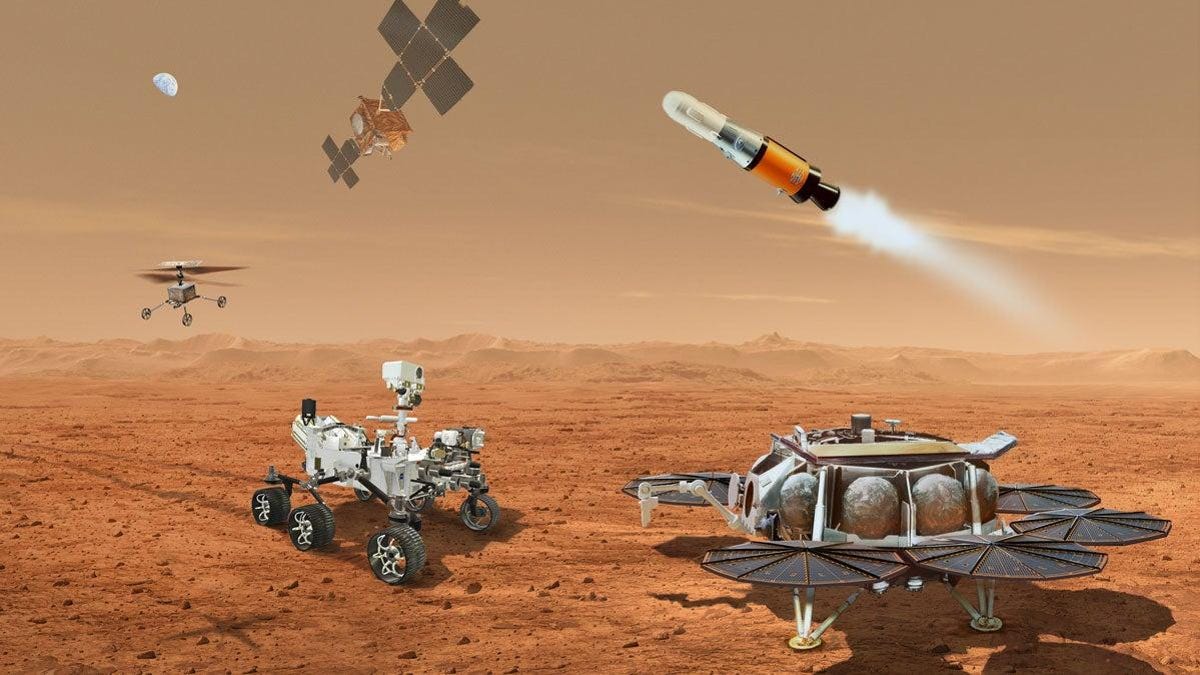
NASA is scaling back on its ambitious Mars Sample Return (MSR) program, fearing federal budget cuts to the space agency’s plan to bring back rock and dust from the Red Planet, which has come under heavy scrutiny for having unrealistic costs and timelines.
NASA’s Jet Propulsion Laboratory (JPL) reportedly laid off 100 contractors last week and implemented a hiring freeze as it braces for the new federal budget in 2024, the Los Angeles Times first reported. The space agency also paused work on the Mars Sample Return’s Capture, Containment and Return System, an essential aspect of the MSR program, anticipating that the Mars mission will receive less than one-third of the requested funding. This critical system is designed to collect samples in orbit and return them to Earth.
Advertisement
“Adjusting to such a large budget cut in one year will be painful,” JPL director Laurie Leshin wrote in an email that was sent out to employees on Thursday, according to the Los Angeles Times. “It is also becoming more likely that there will be JPL workforce impacts in the form of layoffs, and the way such JPL workforce actions are implemented means that the impact would not be limited to MSR.”
Advertisement
NASA requested $949.3 million for Mars Sample Return in its budget proposal for 2024, but it is anticipating $300 million to be allocated for the mission this year. That’s 36% of the $822-million budget MSR received in 2023, a sign that the Senate Appropriations subcommittee responsible for overseeing NASA’s budget is clamping down on the space agency for having unrealistic cost and scheduling expectations for the Mars mission.
Advertisement
In its proposed 2024 budget for NASA, the Senate Appropriations subcommittee directed the space agency to submit a year-by-year funding profile for MSR within the $5.3 billion lifecycle cost outlined in the 2022 planetary science Decadal Survey. If NASA is unable to do so, it could face mission cancellation, the subcommittee wrote in a report issued in July.
Mars Sample Return, a collaboration between NASA and the European Space Agency to bring back rocky samples from Mars, involves a fleet of spacecraft, including an orbiter, lander, two helicopters, and a rocket, that will be assembled and sent to the Red Planet by 2028.
Advertisement
The mission, which could gather clues as to whether life once existed on Mars, will be exceptionally difficult to pull off. In September 2023, an independent review board (IRB) issued its final report on MSR, referring to it as a “highly constrained and challenging campaign,” with “unrealistic budget and schedule expectations from the beginning.”
The report suggested that the mission could cost between $8 billion and $11 billion, far more than original estimates of $4.4 billion. Meanwhile, NASA still hasn’t declared an official cost estimate for its sample return mission. The report also stated that there’s a “a near zero probability” that the lander and orbiter would be ready for launch in 2028
Advertisement
In light of the report, NASA announced that it was considering an alternative architecture for its complex mission and formed a response team to address the findings of the report. Later in November 2023, NASA announced that it was ramping back its activities on MSR in order to develop a revised way of bringing the Martian rocks back to Earth.
Although NASA has been criticized for the execution of its MSR program, the mission itself has received praise for the significance it holds for the scientific community. “A successful MSR campaign will revolutionize our understanding of the history of Mars, the Solar System, and the potential for life beyond Earth,” the independent review board wrote in its report. So while it may take a little longer to pull it off, there’s no reason to give up on MSR just yet.
Advertisement
For more spaceflight in your life, follow us on X (formerly Twitter) and bookmark Gizmodo’s dedicated Spaceflight page.
Services Marketplace – Listings, Bookings & Reviews